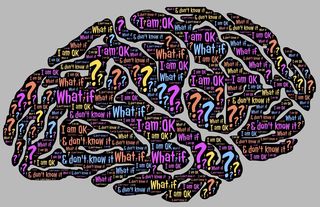OCD
Mental Rituals in Obsessive-Compulsive Disorder
Find out how the best OCD treatment combats mental rituals.
Posted January 27, 2016 Reviewed by Ekua Hagan

As I mentioned in a previous post, there are common therapist mistakes in exposure and response prevention (ERP), the best psychotherapy for OCD. One of these mistakes is not knowing how to help individuals whose compulsions (or "rituals") are primarily mental.
Mental compulsions involve doing something in one's head in response to an obsession in order to prevent a feared outcome, or to reduce the anxiety that the obsession causes. For example, a person with religious obsessions may fear that her children will become sick if she thinks blasphemous thoughts. In response to any blasphemous thoughts or images that come to mind, she will repeat to herself a memorized prayer about the greatness of God along with requests for her children's protection.
Other common types of mental compulsions include:
- Reassuring oneself that "everything is OK"
- Wishing or ‘‘should’’ statements (e.g., wishing something to be different)
- Silently repeating special words, images, or numbers
- Counting and re-counting
- Making mental lists
- Reviewing thoughts, feelings, conversations, or actions
- Erasing unpleasant mental images
- "Un-doing" something in one's mind
Some individuals with OCD describe themselves as “pure obsessional” or “Pure O,” meaning they have obsessions without compulsions. However, what appears to be “Pure O” typically turns out to involve mental compulsions, which functionally are the same as compulsions that are visible to others (such as repetitive hand washing). Both types of compulsions are meant to reduce the chance of something bad happening and to reduce the person’s distress.
In every instance of “Pure O” that I’ve encountered, mental compulsions have been present, which is in line with research findings. In a study of over 1000 OCD sufferers, every single person was found to have both obsessions and compulsions–including the one percent of individuals who initially thought they had only obsessions. A related study reported that individuals who supposedly have “Pure O” engage in mental compulsions and reassurance seeking.

Does it matter that “Pure O” actually includes rituals, or is it an academic distinction without a difference? In practice, it probably matters a great deal. One of the crucial components of exposure and response prevention, obviously, is preventing the compulsions.
If the OCD sufferer (or therapist) doesn’t recognize mental compulsions and reassurance seeking as compulsions, then treatment will not effectively target these behaviors. As a result, the person is likely to stay stuck with the OCD. When the compulsions are recognized for what they are, they can be treated just like any other ritual in ERP.
The first step in treating OCD that involves primarily mental rituals is to recognize the familiar cycle of obsessions and compulsions. Just like with observable rituals, mental rituals maintain OCD by providing temporary relief from the OCD-related distress.
Some clinicians may fail to recognize covert/mental rituals, and people with OCD similarly may have a hard time distinguishing between an obsession and a mental compulsion. When thoughts are coming quickly one after another in a jumbled mess, some causing distress and some intended to relieve that distress, the compulsions can be hard to identify.
The way to tell a mental compulsion from an obsessive thought is to ask what the function of the mental act is:
- Obsessions increase anxiety.
- Mental compulsions are intended to decrease anxiety.
Once a person knows what his or her mental rituals are, they have to be eliminated. During ERP the individual must avoid doing mental rituals during exposure—for example, saying ritualized mental prayers to neutralize the fear of harm that comes from doing the exposures. These kinds of private rituals undermine the exposures and can prevent the person from getting better.
As discussed in a post on Janet Singer's OCD Talk blog, ERP for mental rituals requires doing the opposite of the rituals and allowing oneself to have the distressing thoughts like “I’m a devil worshipper,” without any mental rituals to counteract these thoughts.
Easier said than done! A lot of the difficulty, of course, comes from the almost automatic nature of the mental rituals; people with OCD often say they do a mental ritual even when they’re trying not to. For this reason, the ERP therapist and person with OCD will need to work closely and creatively together to find ways to block the mental rituals. For example:
- Reading things out loud that provoke obsessions so the mind is not free to perform mental compulsions
- Using exposure statements, such as saying “I’m friends with the devil,” instead of engaging in a ritualized prayer
- "Spoiling" the ritual by saying an exposure statement if the person realizes he or she performed a mental ritual
One response that's typically not helpful is to tell oneself, “that’s just my OCD” and similar statements when experiencing an obsession. These kinds of statements play OCD’s game of looking for certainty and trying to find a short-term fix to make obsessions less upsetting. As such, these responses to obsessions often become a ritual, another way to neutralize the anxiety and uncertainty that the obsessions cause.

A more effective long-term solution is to answer obsessions with exposure statements that acknowledge uncertainty: "I can't know for sure that I locked the door"; “Maybe I did sell my soul to the devil”; “God might punish me for having that thought.” While I’ve focused here on religious obsessions as examples, these principles apply to any obsessional content.
The bottom line is that, contrary to what some people with OCD believe or have heard, ERP can successfully address mental rituals. Armed with knowledge about how to recognize mental compulsions, determination to conquer them—and often with the help of a skilled therapist—individuals with mental compulsions can live more enjoyable and fulfilling lives.
This post is based on previous posts that appeared on OCD Talk and sethgillihan.com. It draws from the following article: Gillihan, S. J., Williams, M. T., Malcoun, M., Yadin, E., & Foa, E. B. (2012). Common pitfalls in exposure and response prevention (EX/RP) for OCD. Journal of Obsessive Compulsive and Related Disorders, 1, 251-257.




